#microcosme11
Note
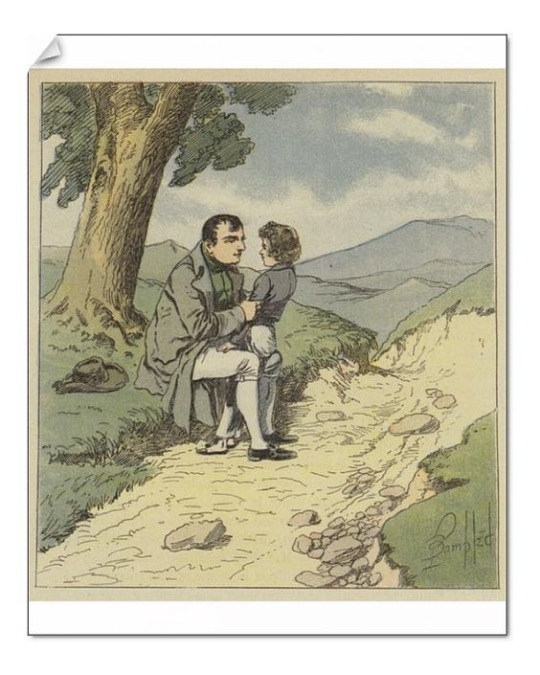
Rating: Cute!
Napoleons make great companions for children. Sure, it looks like the Napoleon is considering whether this boy is edible, and whether or not he should unhinge his jaw like a snake and swallow him whole as a yummy snack, but!
1.) napoleons hardly ever do that
2.) when they do, it’s usually against naughty British children who ate dessert before dinner or didn’t do well on their lessons or disappointed their parents
3.) this napoleon looks so content! And napoleons are bad liars and quick workers. If he wanted to eat the boy, he’d already be eaten
67 notes
·
View notes
Text
Review of Napoleon (2023)
So I saw Napoleon (2023).
eyes glaze over
collapses and melts into a puddle
This is possibly the most soporifically boring, relentlessly mediocre so-called "epic" I have had the misfortune to see.
Plotless, pointless, and devoid of anything approaching characterization, the movie can be best described as reenacted scenes from a wikipedia article about Napoleon as written by the Anti-Jacobin.
The whole thing is suffused with British reactionary propaganda circa 1815. The characterizations are all courtesy of the Anti-Jacobin and Rowlandson’s cartoons. Robespierre is a tyrant, Napoleon is a buffoonish loutish thug, and Josephine is a slut. There’s nothing there. There’s no character arcs, no development. Sure, it’s pretty enough, but it's boring. So, so, so boring.
While watching it, I was frequently in a fugue state, floating over my body, wondering, "what is a movie? is this what they're like now? with no drama, no characters, no arcs, no interest?"
In fact, I didn't watch it: I endured it.
Joaquin Phoenix is awful. He is completely miscast on every conceivable level. Mumbling, monotone, and charmless-- I never for one moment thought I was watching Napoleon-- it only felt like Phoenix's cosplay. He and Vanessa Kirby have so little chemistry they might as well be appearing in different movies. They supposedly have this grand obsession/love story, but this amounts to sitting in the same room staring off in boredom. There's the occasional ridiculous sex scene which is always doggie style with clothes on. But for the most part, Josephine just stands in the rain or stares off into the mist.
Oh yeah there's the occasional battle. Eh…
Napoleon’s life was filled with colorful characters like the foppish, extravagant and brave Murat, the bold and foul-mouthed Lannes, the scheming, irrepressible Fouche, and the bubbly nymphomaniac Pauline, none of whom are here, and you have a bunch of interchangeable extras standing around rooms or battlefields. The only character who makes any impression whatsoever is Edouard Philipponnat as Czar Alexander, and I would have rather had a movie starring this actor. Alas, that's not what we got.
A lot of money was spent on this movie. A lot of choices were made. The result was a bland, forgettable dud that immediately fell into a memory hole as soon I departed the theatre.
As Napoleon himself would say, BAH!
PS. @microcosme11 and I didn't watch the entire thing, because it is 2 hours and 40 minutes long. As all the restaurants in the neighborhood were closing at 10, we left half an hour early, right before Waterloo and after Josephine died of pneumonia, so we could have burgers and a richly deserved beer.
PPS. Feel free to ask me for specifics!
@thiswaycomessomethingwicked @lordansketil @joachimnapoleon @usergreenpixel @twice-told-tales @josefavomjaaga @bunniesandbeheadings @jefflion
#napoleon movie#ridley scott's napoleon#napoleon film#napoleon 2023#ridley scott#napoleon bonaparte#napoleon#boy what a stinker#I knew it was going to be bad but this was...#like Overdrawn at the Memory Bank bad but with more money thrown at it#but the burgers were really good!
119 notes
·
View notes
Photo

A book cover illustration I did for author (and Napoleon enthusiast) Diane Scott Lewis is now live! It’s for her book Napoleon's Elysium: Desire and Betrayal on St. Helena, a Kindle exclusive, with design done by the one, the only @microcosme11. If you’re interested in Napoleon, historical romance, or just an engaging, epic read with memorable characters, drawn from history, I highly recommend it!
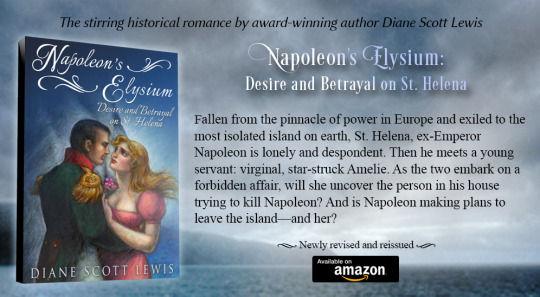
#napoleon#napoleon bonaparte#art#illustration#book cover#romance art#napoleon's elysium#diane scott lewis
169 notes
·
View notes
Text
Victor Hugo on Talleyrand's death
For @empirearchives who was interested, here's a translation of Victor Hugo's text about Talleyrand's death. My thanks to @microcosme11 for her help <33
Choses Vues, Victor Hugo
1838
Talleyrand
19th of May
In the Rue St-Florentin, there is a palace and a sewer.
The palace, with its noble, rich, and dull architecture, was long called "Hôtel de l'Infuntado"; today, we read on its front door: Hôtel Talleyrand. During the fourty years he lived on this street, the last host of this palace might never have set eyes on this sewer.
He was a stranged, feared, and considerable character: his name was Charles-Maurice de Périgord; he was noble as Machiavel, a priest like Gondi, defrocked like Fouché, witty as Voltaire, and lame as the devil. One could say that everything limped with him: the nobility which he had put to the service of the republic, the priesthood he had dragged on the Champ-de-Mars then threw down the drain, the marriage he had broken by twenty scandals and by a voluntary separation, the wit he dishonoured through vileness. This man, nevertheless, had grandeur.
The splendours of both regimes were mixed together inside of him: he was prince of the old kingdom of France, and prince of the French Empire.
For thirty years, from the depth of his palace, from the depth of his mind, he had just about led Europe. He had let the revolution call him "tu", and had smiled at it, ironically of course; but it had not noticed. He had approached, known, observed, pierced, stirred, upturned, delved into, mocked, intellectually fertilized all the men of his era, all the ideas of his century, and there had been a few minutes in his life when, holding in his hand the four or five fearsome threads that moved the civilized universe, he had had for a puppet Napoleon the First, Emperor of the French, King of Italy, Protector of the Confederation of the Rhine, Mediator of the Swiss Confederation. Such was the game this man played.
After the Revolution of July, that old race, whose grand chambellan he was, having fallen, he found himself standing on one foot and told the people of 1830, sitting, bare-armed, on a pile of cobbles: Make me your ambassador.
He had received Mirabeau's last confession and Thiers' first confidence. He had said himself he was a great poet and had made a trilogy in three dynasties: Act I, Buonaparte's Empire; Act 2, The House of Bourbon; Act 3, The House of Orleans.
He had done all of this in his palace, and, in this palace, like a spider in its web, he had attracted into it and taken successively heroes, thinkers, great men, conquerors, kings, princes, emperors, Bonaparte, Sieyès, Mme de Staël, Chateaubriand, Benjamin Constant, Alexander of Russia, Wilhelm of Prussia, Francis of Austria, Louis XVIII, Louis-Philippe, all the golden, shiny flies who buzzed in the history of those last fourty years. The whole sparkling swarm, fascinated by this man's deep eye, had successively passed under the dark door that bore, written on its architrave: Hôtel Talleyrand.
Well, the day before yesterday, 17 March, 1838, that man died. Doctors came and embalmed the corpse. For this, like the Egyptians, they first withdrew the bowels from the belly and the brain from the skull. Once done, after they had transformed the prince de Talleyrand into a mummy, and nailed this mummy in a white satin-lined coffin, they withdrew, leaving upon a table the brain, that brain which thought so many things, inspired so many men, built so many edifices, led two revolutions, fooled twenty kings, contained the world.
Once the doctors were gone, a valet entered, he saw what they had left. Hold on! they forgot this. What to do ? He remembered that there was a sewer in the street, he went there, and threw that brain into this sewer.
Finis rerum.
73 notes
·
View notes
Text
@captainknell @microcosme11 @kaxen @maggiec70 @josefavomjaaga @tairin @suburbanbeatnik @amypihcs @joachimnapoleon Guys, in Spain that one Ridley Scott movie about Napoleon will be out on November 27th. I will post both my initial impressions and a full review, rest assured. I want to see this train wreck personally.
22 notes
·
View notes
Text
@microcosme11 I strongly apologise for tagging you on this brand new post, but 'Tumblr' cannot send my message to you. I shall paste it here:
"Sorry, my previous message could not be sent. I shall try sending it again. Here it is : I have just discovered that "Joséphine Ou La Comédie Des Ambitions" is on 'Dailymotion'. All five episodes were posted by a passionate user in their original format from their 'D.V.D.' copy. You can also use a 'website' to download each video on your device. Here is the 'link' to the first episode: https://dai.ly/x8pifqw and this one is for the 'Dailymotion' 'Downloader' 'website' : https://en.savefrom.net/10-how-to-download-dailymotion-video-50.html . Awwww... That is so sweet! I have first fallen in love with him when I was twelve years old when I found one of my Dad's history magazines in the living room. His painting was printed on the back cover and it was more than love at first sight... I was in pure awe. This was the painting:"

13 notes
·
View notes
Text
Maria Leopoldine of Austria-Este
@microcosme11 had asked me about this lady of the Bavarian court:

Her name is Maria Leopoldine von Österreich-Este, and she played a huge role in making sure that Max Joseph, Eugène‘s future father-in-law, inherited the title of Elector of Bavaria. As a matter of fact, it‘s a highly educating tale of how to become elector in Munich in the first place.
Unfortunately, it will need a lot of explanation, as this takes us deeply into the rivalries and century-old feuds between the different German principalities that Napoleon Bonaparte would soon know to exploit so well. Let‘s just say, Habsburg (Austria) and Wittelsbach (Bavaria) had not seen eye to eye for quite some time when the Bavarian branch of House Wittelsbach, the one holding the position of Bavarian elector, was about to go extinct.
Many branches of the family went extinct around that time, in fact, and not only of this family. Be it that centuries of inbreeding finally took their toll, be it a general unwillingness to do more than the bare minimum to ensure the family had an appropriate heir (»No, no, no. We‘ve done our duty, we‘ve had one son. It‘s not our fault he died. We‘re not doing that again!«) or even to marry an appropriate but not necessarily attractive partner with whom you could have children able to inherit – the number of males in those princely families got rather low during the 18th century.
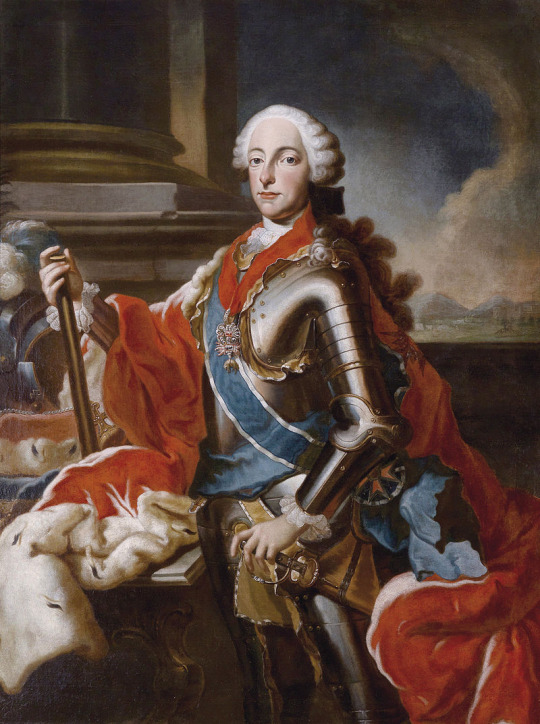
In 1777 – twelve years before the French Revolution, just for context – Maximilian Joseph III, the last elector from the old Bavarian branch of the Wittelsbach family, died without a son. There were of course more branches of the family, most importantly the branch that held the electorate of the Palatinate, and then some less important, not ruling branches, like the Zweibrücken-Birkenfelds. Now, technically, if a German prince died without an heir, things would get all medieval: the liege – the Bavarian electorate, in this case - would fall back to the liege lord. The emperor.
The Habsburg emperor in Vienna! No f-ing way!
... said not only the Bavarians but also the kings of France and Prussia, who had no interest in Austria gaining that much territory. In order to prevent it from happening, the different Wittelsbach branches in a multitude of »house contracts« had declared several years before that the family branches would all inherit from each other if one went extinct. The Austrians might have protested against that arrangement but they had just done something quite similar in order to ensure that the last emperor‘s daughter Maria Theresia could inherit, so they were in a bad position to argue. Which doesn‘t mean they didn‘t. But after some more bad blood, even a »War of the Bavarian Succession« that is a funny story in itself, things settled down, and a guy named Karl Theodor (Charles Theodore) became elector of both Bavaria and the Palatinate.

There was a huge down-side to this advancement, from his perspective: he had to move to Bavaria. Uncivilised, almost medieval, hilly-billy Bavaria. He hated that place, and for good reasons. He was a very cultivated person, and this was a very uncultivated place (according to some, it still is *coughcough*). The Bavarians, as to them, liked this new guy in Munich about as much as he liked them. And another problem was already looming on the horizon: Karl Theodor had plenty of children – but only one son with his wife, and this son happened to die a day after he was born. Apparently this was one of those cases where the spouses thought once had been enough and refused to give it another try. And Karl Theodor could not even marry somebody else because – catholic. No divorce. And his unloved wife was in good health. To sum up: No immediate heir in this family either.
Which brings us to the Zweibrücken family branch. At the time when Karl Theodor moved to Munich, this branch of the Wittelsbach family consisted of two brothers: Karl August and Maximilian Joseph (yes, that‘s our Max, future king of Bavaria). Their father, Friedrich Michael, had died young as a military officer in French service, so they had grown up at the court of their uncle, Friedrich Michael‘s older brother Christian. Christian – just saying – had simply refused to marry a partner of equal birth and instead conducted a morganatic marriage with a French actress. A very happy one, by the way. The burden to ensure the family would continue thus had fallen to Friedrich Michael, who had married a sister of Karl Theodor‘s wife, had made her four kids (two sons, two daughters) and bedded pretty much every willing lady of the French court before accusing his wife of adultery, locking her up in some monastery (Max Joseph probably saw his mother last when he was three years old), and then getting himself killed in some war or other.
By 1778, both Friedrich Michael and Christian were dead, and as Christian‘s many children could not inherit his titles, Karl August had become Count Palatine of Zweibrücken (Deux-Ponts in French). Due to his »uncle« Karl Theodor‘s lack of a legitimate son, he and his younger brother Max Joseph also were the next heirs to the combined Bavarian and Palatine electorate.

(Karl August, older brother to future king Max Joseph)
Meanwhile in Munich, Karl Theodor really got annoyed with this gruesome country he had been forced to move into. However, for the first time in a long while this was a Bavarian elector who had good relations with the Habsburgs. After some negotiations between Munich and Vienna Karl Theodor and emperor Joseph II came up with a plan that would make everybody happy: Karl Theodor would exchange the Bavarian territory (or some portion of it) for the Austrian Netherlands. Austria would finally add Bavaria to its territory, and Karl Theodor could move to a nicer place.
This caused an uproar among the Bavarian population. Becoming Austrians? Never! - The Bavarian estates sent delegation after delegation to the Zweibrücken nephews with desperate pleas for help (they also paid these nephews‘ debts). Karl August and Max Joseph immediately protested against the plan, and it turned out that according to the fineprint in those house contracts mentioned above Karl Theodor could not make the deal with Vienna without his nephews‘ consent. Bummer.
France and Prussia also put a word in, and France did even more: When Karl August‘s only son (yet another only child) died in 1784, with little chance for a legitimate replacement, the French king personally made sure that Max Joseph, the younger brother, a great womanizer and obstinate bachelor, would get married to an appropriate lady who could give birth to many legitimate heirs of the Bavarian electorate (oh, and Louis also paid Max Joseph‘s debts. That‘s a recurring theme in the story). Max Joseph, after lots of wailing and resisting, was finally dragged in front of the altar in 1785 and, to his great surprise, found that he loved marriage life, family and children. Not necessarily enough to give up on his womanizing ways. But this whole family thing, having kids and stuff? That was also kinda fun.

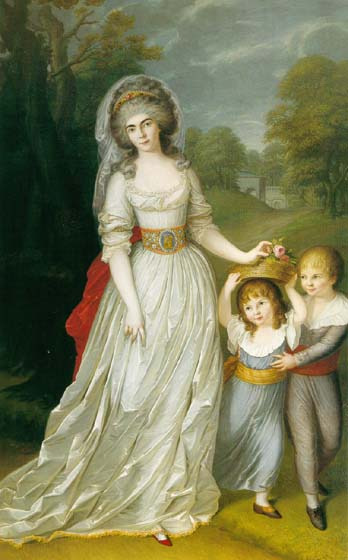
(Max Joseph’s first wife Auguste Wilhelmine and their two oldest children, crown prince Ludwig and - yes, that’s little Auguste)
Let‘s fast forward a little: The French Revolution breaks out. Max Joseph, so far one of the many foreign princes in French service, looses everything and, with a wife and five children, becomes a refugee. For some time, so does his brother. Then over the next years, many people die: Max‘s first wife (he will quickly remarry), one of his daughters - and his brother Karl August. Making Max Joseph the heir apparent to the electorate of the Palatinate and of Bavaria.
Except that, in 1794, one more person died: Elector Karl Theodor‘s wife. The Austrians acted quickly and offered the mourning widower (who had 70 years of age) an archduchess as new bride in order to produce an heir with, just so Bavaria would not fall into the clutches of this former French colonel Max Joseph von Zweibrücken who was very unlikely to make any similar deals with the Habsburgs.
And now we finally can introduce the lady this is all about:

Maria Leopoldine was the daughter of Ferdinand Karl von Österreich-Este, who in turn was one of the many children of Maria Theresia (i.e. a brother to the emperors Joseph and Leopold and queens Marie Antoinette and Maria Carolina of Naples) and ruled in Milan. (A year after Maria Leopoldine had married, her family would be kicked out of their home by one Napoleon Bonaparte and his army of Italy). She was 19 years old when she was ordered to marry 70-year-old elector Karl Theodor, and a young lady with lots of self-esteem. Allegedly, when she first saw the bridegroom‘s portrait, she exclaimed: »Thank god he‘s already that old!« - Obviously, it was love on first sight.
The marriage life of the happy newly-weds turned out to be just as full of harmony and roses as could be expected: Maria Leopoldine locked her bedroom door. Well, at least for her husband. Not so much for anybody else. And to make matters worse, her new »nephew« Max Joseph showed up in Munich, as he did from time to time. Just to remind Karl Theodor who was his heir probably, but this time ostensibly to pay his homage to the new aunt Maria Leopoldine. According to a story crown prince Ludwig was told much later, Max Joseph was quite thorough about this task and, unlike his uncle, did make it into Maria Leopoldine‘s bedroom. Did I mention Max never quite gave up on his womanizing ways?
In any case, Maria Lepoldine had made up her mind: She very much preferred the nephew over her husband, thank you for asking. If there was anything she could do to ensure the Austrians (that is, her own Habsburg family!) would not receive Bavaria, she would do it.
Turns out, she could do a lot.
Fast forward to 1799. Karl Theodor suffers from a stroke while playing cards. It‘s not his first, but this one is serious. The old elector still breathes, but the doctors are agreed there‘s nothing they can do. It‘s just a matter of time now.
Time that the Austrian ambassadors in Munich want to use. Contracts for an exchange or sale of Bavarian territory to Austria have long been drawn up, all they need is the elector‘s signature! Surely now, in his last hours, Karl Theodor will not hesitate any longer? They enter the Munich Residence, talk or bribe their way into the private rooms of the elector’s family, into the elector‘s rooms, to his bedroom - and then there‘s somebody on the doorstep. Maria Leopoldine.
And. She. Will. Not. Move. - Forget Gandalf against the Balrog of Moria. Maria Leopoldine against the Habsburg ambassador was the real thing. In the end, the Austrians, most likely after lots of cursing and footstomping, had to leave. In case they hoped they would be luckier at another occasion, they were disappointed: For the first time during their marriage, Maria Leopoldine focused solely on her husband and gave him all her attention, until he breathed his last.
At which point she had all gates of Munich locked. All Austrian couriers on their way to inform Vienna were turned back. The only dispatch that did go out was one to Max Joseph, in which Maria Leopoldine declared herself Max‘s devoted subject and invited him to come to Munich and take over power as soon as possible.
Which Max did. Not necessarily as quickly and forcefully as Maria Leopoldine had acted. But it sufficed.
There was one more point in which Maria Leopoldine helped Max a lot. After her husband‘s death, state officials in the presence of the Austrian ambassador had an interview with her, inquiring if Maria Leopoldine happened to be pregnant. Because a son by Karl Theodor, even posthumously born, would have inherited before Max Joseph. She answered »No«.
Now, as chance would have it, some months later, she went on a lengthy journey that we are very badly informed about, and only returned a year later, after most likely having given birth to a child somewhere on the way. A child whose father surely had not been Karl Theodor. But the Austrians probably would not have cared.
Maria Leopoldine stayed in Munich, much beloved by Max Joseph, and became the enfant terrible of his court, had lovers in abundance, excelled at investing her money, at some point bought a farm where she, if need be, personally helped with the hay-making, and even married morganatically (possibly so she had an official father for her children). She was a close friend of Eugène but not so much of his wife. Maybe she never quite forgave Auguste that her arranged marriage had turned out so well when her own had been such a disaster.
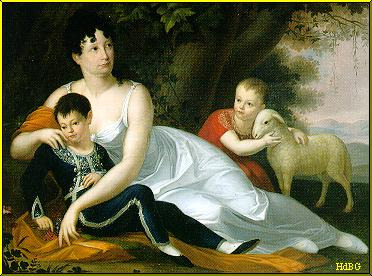
(Maria Leopoldine in later years, with her two sons)
#Maria Leopoldine of Austria-Este#Bavarian court#Munich#max joseph#charles theodore#habsburg and wittelsbach
26 notes
·
View notes
Text
15 people, 15 questions
Thank you for tagging me, @ouiouixmonami and @my-deer-friend. :-)
1. are you named after anyone?
No, but not for a lack of trying on my grandfather’s side
2. when was the last time you cried?
I honestly do not recall.
3. do you have kids?
There are few things that I like to keep private. 😉
4. what sports do you play/have you played?
I tried out a lot of things and still like to be active. There are many possibilities for water sport where I live but my absolute passion is climbing and figure/ice skating. Oh, and high jumping (Is that the right term? Because it does not feel like proper English to me.)
5. do you use sarcasm?
All the time … much to the annoyance of the people around me.
6. what’s the first thing you notice about people?
Their hands - hands tell you so much about a person’s life.
7. what’s your eye color?
Predominantly blue
8. scary movies or happy endings?
Well, this is not mutually exclusive … but if I had to choose, I take scary movies.
9. any talents?
I have quite a good memory when it comes to faces.
10. where were you born?
Somewhere in Germany
11. what are your hobbies
Reading, writing, music, hangging, out with friends ... pretty typical stuff.
12. do you have any pets?
No
13. how tall are you?
175 cm
14. favorite subject in school?
Biology – by a far stretch. But I generally truly enjoyed school.
15. dream job
Put me in a lab and I am happy as could be.
I am tagging @microcosme11, @acrossthewavesoftime and @echo-bleu - but as always, no pressure. :-)
4 notes
·
View notes
Text

Inspired by @microcosme11’s recent post. I feel like Augereau would actually find Lewis Goldsmith’s description of him in Secret History of the Cabinet of Bonaparte quite flattering, so here he is, proudly showing it off.
(The original painting of him pointing at his own portrait can be seen here.)
31 notes
·
View notes
Text

I posted 1,657 times in 2022
That's 1,657 more posts than 2021!
110 posts created (7%)
1,547 posts reblogged (93%)
Blogs I reblogged the most:
@kaxen
@joachimnapoleon
@microcosme11
@josefavomjaaga
@kaxenart
I tagged 269 of my posts in 2022
#louis-francois lejeune - 81 posts
#napoleonic - 81 posts
#napoleonic era - 70 posts
#napoleonic wars - 68 posts
#louis francois lejeune - 54 posts
#french republican calendar - 27 posts
#french revolutionary calendar - 27 posts
#handsome hussars - 24 posts
#fighting for napoleon french soldiers letters - 17 posts
#youtube - 16 posts
Longest Tag: 128 characters
#giving too much credit to nappy is probably my peeve outside of there's only one thing with lejeune in it and they did him dirty
My Top Posts in 2022:
#5
The Battle of Zurich, 25th September 1799 by François Bouchot
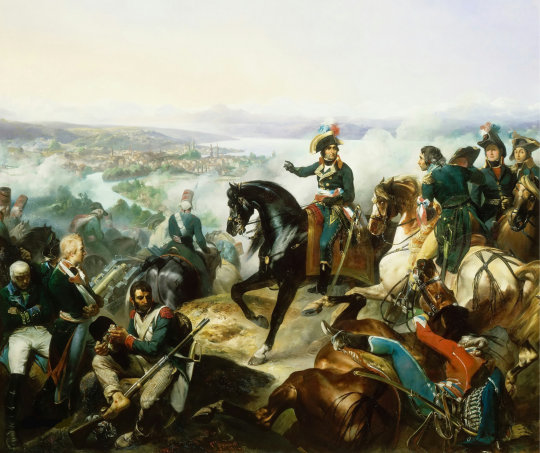
Guy having the Worst Day
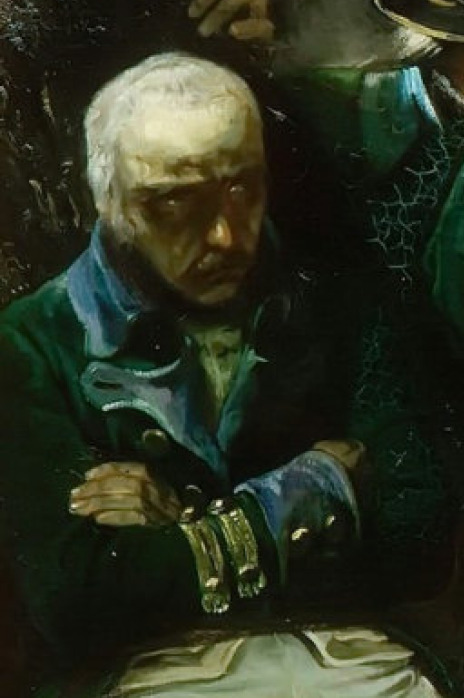
I like this guy
See the full post
20 notes - Posted August 5, 2022
#4
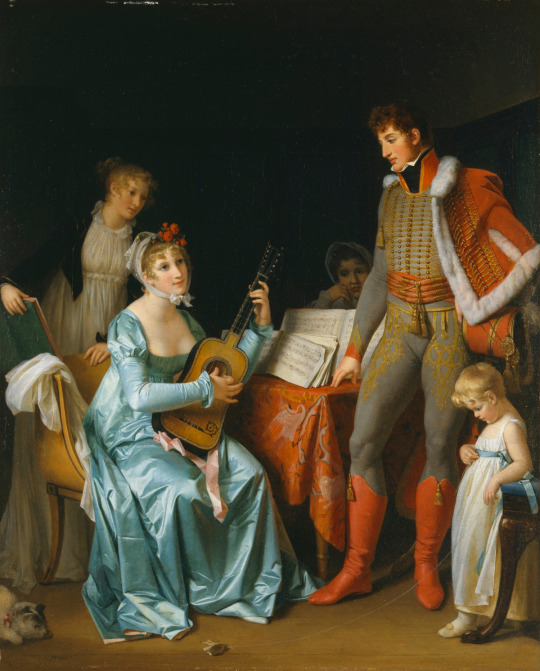
Denver Art Museum only had one Hussar pop up in search, but this man is Maximum Ye Olde Spandex.
....I have no idea what the French equivalent of the "Ye Olde" affectation is...
Le Hussard en Famille by Marguerite Gérard
24 notes - Posted April 27, 2022
#3
Another letter from Fighting for Napoleon French Soldiers' Letters 1799-1815
Caspet Spain 18 November year 1809
Dear father and mother and all the family
[...] I ask you to tell me how my brothers are. You never tell me if they are going to be drafted. I recommend that my brothers learn a wind instrument because if they were unlucky enough to be conscripted, they could join a military band. I hope that you will send money with your answer. I have to tell you that Hubert Pasleau was killed in Saragossa. There is no military band in the 115th [Regiment of the Line]. There was one band but they were all slain.
Send my regards to the widow Fortin and tell her that her son is well [. . .]
"Join the military band to have less chance of dying. Also our entire band died"
36 notes - Posted May 9, 2022
#2
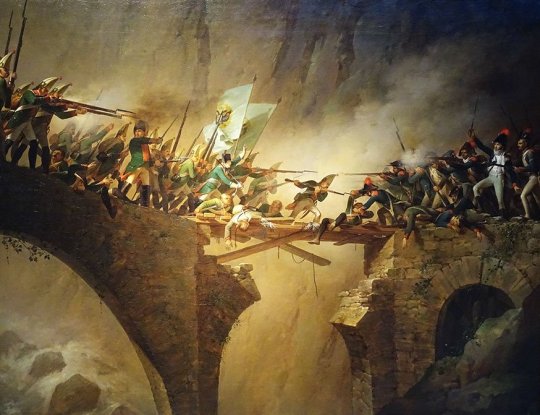
Bataille au Pont du Diable 1799 by Jean Baptiste Seele
I assume the tiny-ness of the planks is for drama, but like the visuals of it all
41 notes - Posted May 25, 2022
My #1 post of 2022
Some Detail Shots of Passage du Rhin par l'armée française à Dusseldorf, 6 septembre 1795 by Louis-Francois Lejeune


See the full post
42 notes - Posted April 26, 2022
Get your Tumblr 2022 Year in Review →
1 note
·
View note
Text
So thanks to @microcosme11 who showed a lot of interest in the incredible painting “Battle of Leipzig” by Johann Peter Kraft I’ve decided to consecrate a series of posts to the main participants of the event depicted on the canvas!
It’s simply going to be a bunch of my guesses about who is who over there. 👀

Unfortunately I’m going to illustrate my ideas with such an amount of pictures that it’s simply a necessity to divide this post into several parts…
Well, as an old Russian saying goes, “Don’t feed me bread, just let my speak a lot about 19-century men in fancy uniforms”!
Ahem.
So here comes part 1!
First of all, let’s start with the most important participants - three allied monarchs themselves. Here they are: Alexander I of Russia, Franz II of Austria and Friedrich Wilhelm III of Prussia. 👑
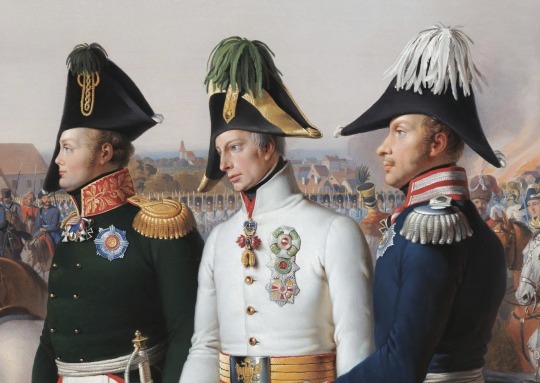
…Aaaaand I was lucky enough to find some old photos I took in the State Hermitage Museum during my last trip to Saint-Petersburg!
I guess Saint-Petersburg is at some point the second home for each and every lover of the Russian Empire. Even nowadays the city itself represents the living remains of that illustrious period in Russian history. :)
As for the paintings those epic depictions of allied monarchs are located in the Military Gallery of the Winter palace. The portrait of Franz II is also one of Kraft’s works which was presented by Kaiser himself to Alexander I when the latter decided to organise the Military Gallery (which is also dedicated to the victory of Leipzig, what a coincidence) in the 1820s while the portraits of Alexander and Friedrich were made by the German painter Franz Krüger who had been working for the Russian Imperial court for a long period of time.
All three of them look truly magnificent but it’s a little bit hard to find the right angle for a photo because they hang pretty high and are gigantic. 😅
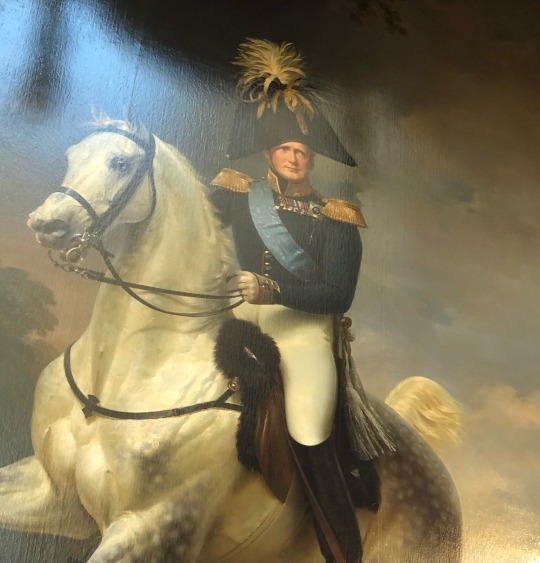
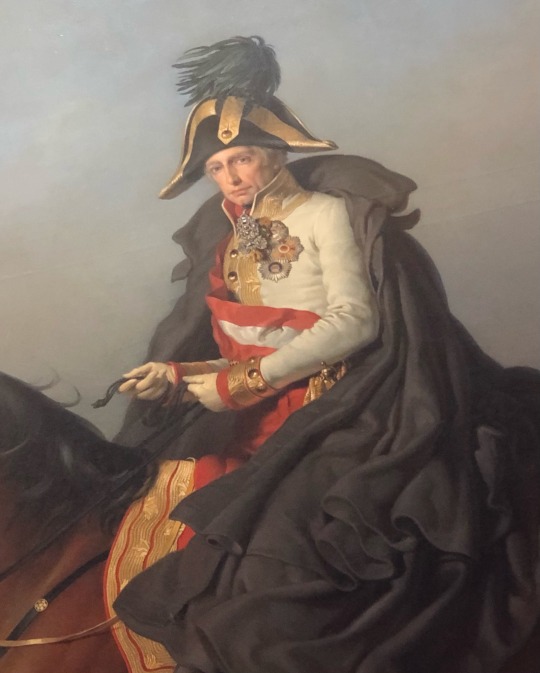
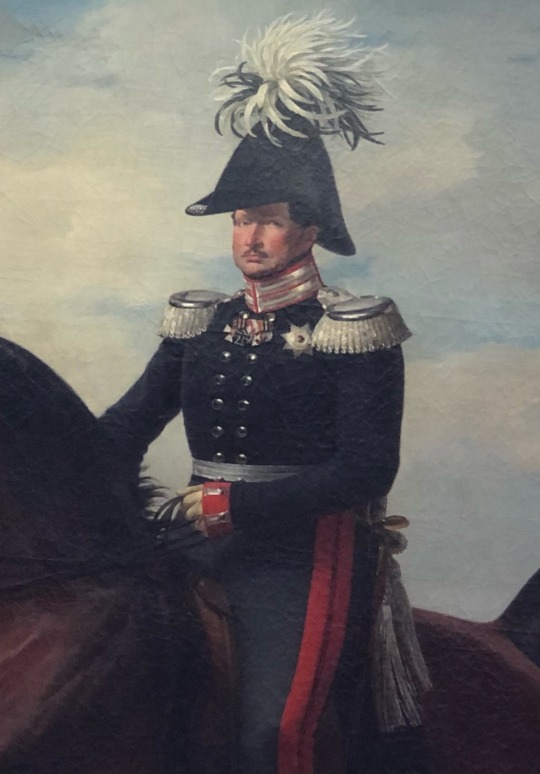
Okay, back to the “Battle of Leipzig”~
Since monarchs were usually followed by an escort of their loyal courtiers, the exact same thing goes for the Kraft’s painting. This time for the major part it consists of different military men. I believe most of them come from the general headquarters.
There are three major figures accordingly behind Alexander, Franz and Friedrich - three chiefs-of-staff of the allied forces.
The first man in the crowd is (I’m still not entirely sure about him but it would be still logical to some extent) August Neidhardt von Gneisenau, quartermaster-general of the Silesian army and Blücher’s right-hand man.
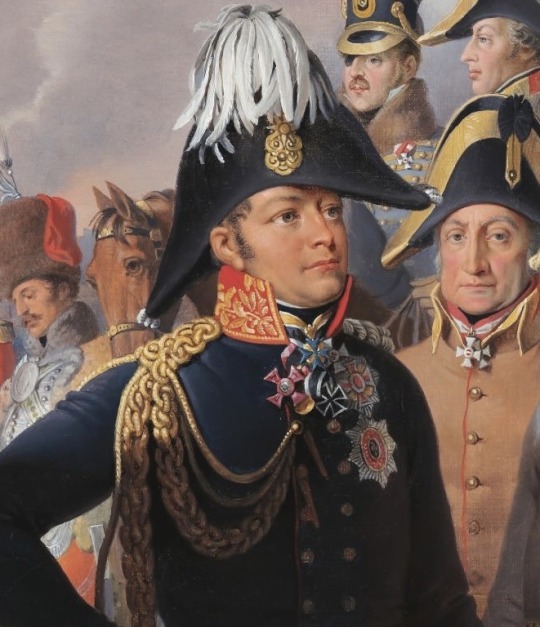

The second one is probably (like I don’t know where his aiguillettes are but the resemblance is quite obvious) Pyotr Mikhailovich Volkonsky, chief-of-staff in the Russian army.
He became one of the Alexander’s closest friends since he was introduced to him by his father Pavel I, the emperor of Russia, when Alexander was still a grand-duke (or how we call him in Russian - цесаревич / tsesarevich ✨).
By the way, Volkonsky and his colleague Mikhail Semyonovich Vorontsov, a general who also went through all Napoleonic wars, were the only commanders in the Russian army who received the Grand Cross of the British Order of the Bath after all the struggles.
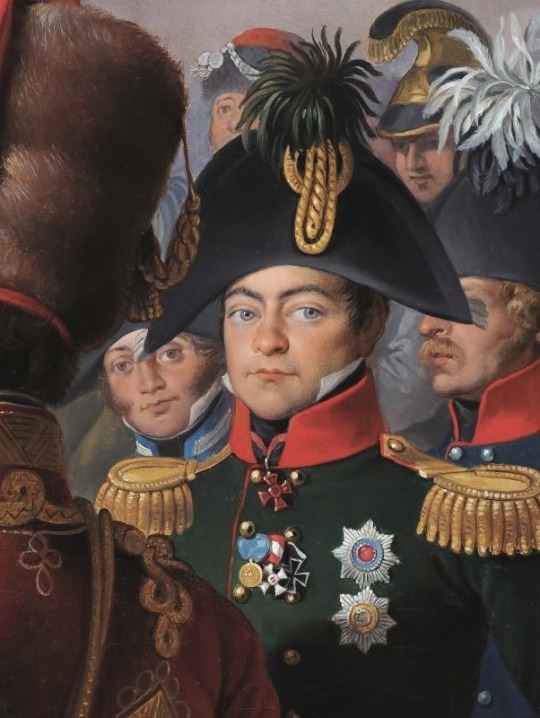
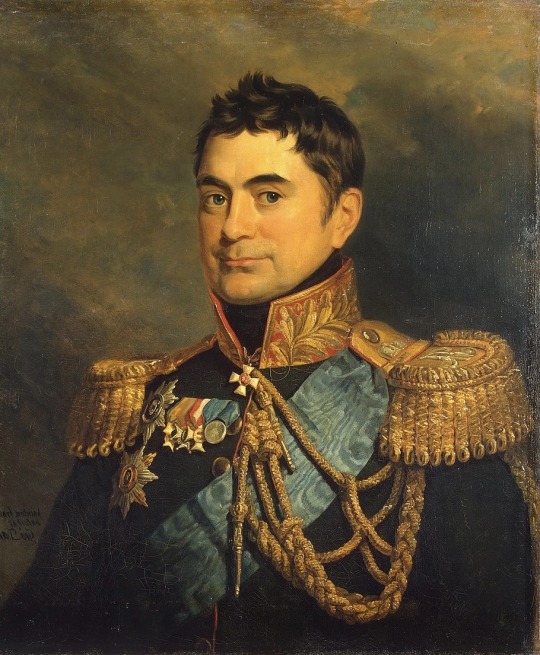
And here is Vorontsov as a small postcriptum. :)
Mikhail was the eldest son of Semyon Romanovich Vorontsov, a Russian diplomat who served as an ambassador in the United Kingdom for almost thirty years! That was the main reason why he knew English language as well as his mother tongue, Russian.
In the nearest troublesome future he and Wellington actually became very good friends as well! 🇷🇺🇬🇧
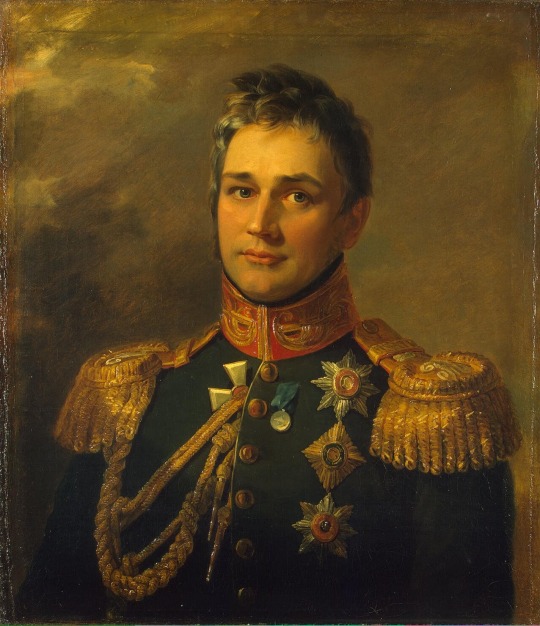
To be continued 🔜
#napoleonic era#napoleonic wars#battle of leipzig#völkerschlacht bei leipzig#battle of the nations#alexander i of russia#franz II of austria#friedrich wilhelm III of prussia#august von gneisenau#pyotr mikhailovich volkonsky#mikhail semyonovich vorontsov#19th century
45 notes
·
View notes
Note

Rating: Cute!
As caterpillars go into cocoons, this Napoleon has morphed into a First Consul! He has a luscious red pelt and - oh, look! He’s started to shed his hair. I’m especially pleased that he has a suspicious glint in his eye, as this means he has not succumbed to hubris as Napoleons are prone to do. An excellent specimen.
31 notes
·
View notes
Text
well guys I'm gonna see it. @microcosme11 and I are going to see That Napoleon Movie. Wish us luck!! @thiswaycomessomethingwicked @lordansketil @usergreenpixel @twice-told-tales
53 notes
·
View notes
Text
How Berthier died: an opinion piece
@microcosme11 reblogged my portrait of Berthier, adding to it some comments to which I responded at some length. I reblogged my original post with my further comments, but was unable to put in a new title on this to indicate the addition of new material.
At the risk of being redundant to those who did notice my extra writing, I have decided to post what I added to my original post and to microcosme’s reblog.
microcosme stated that there are three theories about Berthier’s death and that the truth will never be entirely known, which is undeniable. The three theories are that Berthier was assassinated, that he was the victim of an accident, and that he committed suicide. This is the main topic of my response to microcosme. Here is what I wrote in response to the issues she (I assume microcosme is a she) raised:
As I wrote in the notes, Berthier did want desperately to return to France. I think this was because he wanted to defend France. If he thought the best way to defend France meant serving Napoleon again, then that’s what he would have done. However, I’m of the opinion that by 1815 Berthier no longer believed in Napoleon; it’s just that Napoleon was a better bet to defeat France’s enemies than Louis XVIII was.
About Berthier’s death, as you wrote there are three theories. I am persuaded he killed himself. I think his family believed he killed himself. But. The family would have moved heaven and earth to present his death as anything but suicide. Berthier was raised Catholic, his wife and in-laws were Catholic. A person committing suicide, in the Catholic religion, has died in a state of mortal sin and can’t even be buried in consecrated ground. There is no way in the world that Berthier’s wife and her family were going to have his death be labeled a suicide. The assassination scenario was extremely convenient and face-saving.
So where did this assassination scenario come from? It came from the imagination of Berthier’s four-year-old son. I believe the family pounced on this. I don’t believe there actually were any assassins there. I, for one, saw witches and monsters everywhere when I was four. How difficult would it be for the boy to imagine he saw “bad men” kill his father? Except for this: Bavarian police was closely watching Berthier, not only to prevent him from leaving for France, but to protect him from, well, assassins, or anyone who might have wanted to harm him; Berthier even complained angrily about the police surveillance. Bavarian police saw no strange individuals entering or leaving Bamberg Castle. Berthier’s wife was worried about his mental state, and had asked the servants to watch him closely. The servants, to my knowledge, saw no strangers lurking about. The children’s nurse was right there, and to my knowledge she did not report seeing anyone being in the nursery aside from the children and Berthier. To me, the assassination theory does not hold water.
Now let’s turn to Berthier’s behaviour while at Bamberg Castle. For the first time in his life, the king of workaholics had nothing to do. Not one thing. He was reportedly going out of his mind with boredom. Then there was his desperate, thwarted efforts to go back to France, to defend a country he loved, probably by serving a man whose actions he believed spelled catastrophy and defeat, but who for all that was a better prospect for success than Louis XVIII. It seems also that Louis XVIII was persuaded that Berthier had helped Napoleon to come back from Elba, or at least that he knew about Napoleon’s plans but did not reveal them (which is possible, but not certain; in any event Berthier might have thought that Napoleon did not stand a chance). I don’t know, but I speculate that Berthier figured he was finished in Louis XVIII’s eyes. After reaching Bamberg, he tended his resignation multiple times from the captainship of the King’s Guard, and as far as I remember this was his one and only official role under the First Restauration. All his life Berthier had been the one whose services everybody clamoured to have, and now, if Napoleon did not want him back - and I don’t think Berthier would have assumed that Napoleon would - conceivably nobody wanted anything to do with him.
Berthier’s resignation was finally accepted, severing his link with the King. At about the same time, I believe, his last hope of getting back to France came to nothing. He then did something he had never done in his life: he started to drink, and very heavily. This speaks to me of depression. I think his despair was beyond measure. The day Berthier died, Russians troops were marching under the castle’s windows on their way to France. He went to see his children in the nursery on the top floor of the castle. He saw that a cart was ready to take the children for a ride, and asked the nurse when she was taking them down into the courtyard; in my opinion, he was waiting to be alone on that top floor so nobody would stop him from jumping out the window. The nurse answered she would take the children down when Berthier left the nursery. He went into the next room on the pretence of relieving himself, the nurse heard him cry “My poor homeland!” twice, heard a noise; when she rushed in, she saw an open window and Berthier lying dead in the street.
Could he have fallen? Maybe. It’s plausible. He was probably drunk. But I don’t think it's anywhere near as likely as suicide.
As for Berthier not coming back from Paris after asking Napoleon for a few days’ leave, one of the historians I read, Franck Favier I believe, states that there are documents bearing Berthier’s signature which show that he did come back to Fontainebleau, it’s just that Napoleon’s word was taken at face value without verification. If there was still official business that remained to be done, it’s hard for me to imagine that Berthier would not have come back to conclude it. But if there was no outstanding business to take care of, if Berthier knew that going back to Fontainebleau only meant that Napoleon would keep asking him to go to Elba with him, then I can picture that he would not have returned. By then Berthier was done with Napoleon. About time too. Politically, Napoleon had gone off the tracks quite a while before, and personally, he had treated Berthier shamefully for years and years. It’s a wonder Berthier tolerated it for so long.
Source:
northernmariette
44 notes
·
View notes
Text
Shortly after 10:00 P.M. on 27 September 1601, in the oval chamber of the royal palace at Fontainebleau, the king and queen of France celebrated the birth of their first child. It was a boy, the first dauphin to be born to a reigning French monarch in fifty-eight years. Within nine years he would mount his father's throne, the only firstborn French royal son in over eighty years to become king.
Henry IV, first Bourbon king of France, was so excited over the prospect of a male heir to continue his dynasty that he scarcely left his wife during the twenty-two hours of difficult labor. Queen Marie de' Medici, brought ten months before from her native Florence to succeed the childless, divorced Queen Marguerite of Valois, was undoubtedly even more anxious to produce a live boy. With her first quickening contractions, the prospective parents and midwife were joined by the three ranking Bourbon princes, Henry's own sister, Marie's leading attendants, and five physicians. On finally being convinced by the midwife that the baby was indeed a boy, Henry thrust open the chamber's doors to let some two hundred courtiers stream in. Queen Marie, weak after hours of labor and attacks of colic, was gently told the news by her husband, whereupon she praised God and fainted. Meanwhile, the baby who had occasioned all the excitement rallied from the tiring ordeal of childbirth with the aid of a spoonful of wine, and was handed over to his future governess, Françoise de Longuejoue, baroness of Montglat, and his physician, Jehan Héroard, author of a famous book on the bone structure of horses, Hippostologie.
The birth of the future King Louis XIII was justifiably celebrated throughout France with bonfires and songs of thanksgiving. What a relief it must have been for war-weary subjects to look forward to the perpetuation of the policies and personal qualities of the likable Gallic Hercules, Henry IV! In 1589 Henry had mounted a shaky throne, around which swirled a blood-drenched religious conflict between France's Catholic majority and its Protestant Huguenot minority. In little more than a decade he achieved spectacular successes denied the last three, childless Valois monarchs [..]. By contrast, the first Bourbon monarch of France ended the forty-year Wars of Religion in 1598 through his delicately crafted Edict of Nantes, which guaranteed limited religious rights for the Huguenots. Moreover, this charismatic "restorer of France" also contributed greatly to the accompanying shift in popular and elite mentalite from the Valois climate of violence and regicide to one that worshiped monarchs and focused national hopes on monarchy.
Yet much remained to be done to restore political order and bind the religious wounds. Many French Catholics disapproved of Henry IV's toleration of Huguenots and chafed at his alliances with Protestant states against fellow Catholic monarchs in Spain and Austria. Twenty disgruntled extremists actually tried to kill their king. The Huguenot minority, some 10 percent of the population, were equally dangerous. Their right to worship in the southern mountains and on the western seaboard where they predominated, guaranteed by the Edict of Nantes, was also protected by royally subsidized Huguenot garrisons in 150 fortified towns. This Protestant "state within the state" was bound to rekindle religious animosity between Catholics and Huguenots, just as it stood as a reminder that the French king was far from sovereign in his state.
The hopes and fears accompanying the birth of the future second Bourbon ruler of France ensured that he would be brought up in a demanding political climate. Henry indicated just how public the dauphin's world would be by allowing the horde of courtiers to gaze on the newborn infant, telling a horrified midwife: "Don't get angry. This child belongs to everyone." Later in his childhood, when caught in the middle of an argument between his governess and governor concerning whom he belonged to, Louis would ruefully comment: "Some day I hope I will belong to myself."

The dauphin entered the world of politics, courtiers, and personal servants not as a blank slate to be written on by others at will but with distinct physical, emotional, and intellectual traits. Dr. Heroard described the infant heir as large boned, muscular, and vigorous, with a large, well formed head, brown eyes, small lips a little turned up, very powerful lungs, large arms, straight legs, and long feet. Later painted or drawn portraits show a chubby-faced, well-proportioned boy, with a disconcertingly suspicious look in his penetrating eyes and narrow, pursed lips. More attractive than either his haughty, austere, full-faced mother, or his playful-looking father whose breath reeked and beard was always disheveled, the future Louis XIII gained many compliments on his deportment. A discerning ex-Queen Marguerite, on first seeing him with his governor and riding master, exclaimed: "Oh! How handsome he is! Oh! How well built he is! How lucky the Chiron who teaches this Achilles!"
A. Lloyd Moote- Louis XIII, the Just.
#xviii#a. lloyd moote#louis xiii the just#henri iv#louis xiii#marie de médicis#marguerite de france#la reine margot#i love that marguerite got along well with her ex husband's new family#and that she was good to the children#@microcosme11
5 notes
·
View notes
Text
Dear Neighbors… I just had a panic attack. I’m so sorry but this derails the review schedule… again. Dammit.
(Please don’t worry, I’m feeling better now. I got anxious about something completely unrelated to reviews)
Once again, I’m sorry about this. The review will be out by Saturday and I already have a draft of it… if you still want to see it even after so many delays… @tairin @amypihcs @aminoscribbles @josefavomjaaga @maggiec70 @dartharaiz @blackwidowmarshal123 @pobodleru @count-lero @michel-feuilly @captainknell @microcosme11 @elisabeth515 @klara-1838 @sollannaart @au-pas-camarades , @joachimnapoleon , @kaxen , I’m truly sorry that I broke my promise… but I will correct it. Luckily I’m calming down already.
(Tiny spoiler, I really enjoyed the book! Thank you for writing it, @garethwilliamsauthor ! And thank you to @suburbanbeatnik for introducing me to this story.)
33 notes
·
View notes